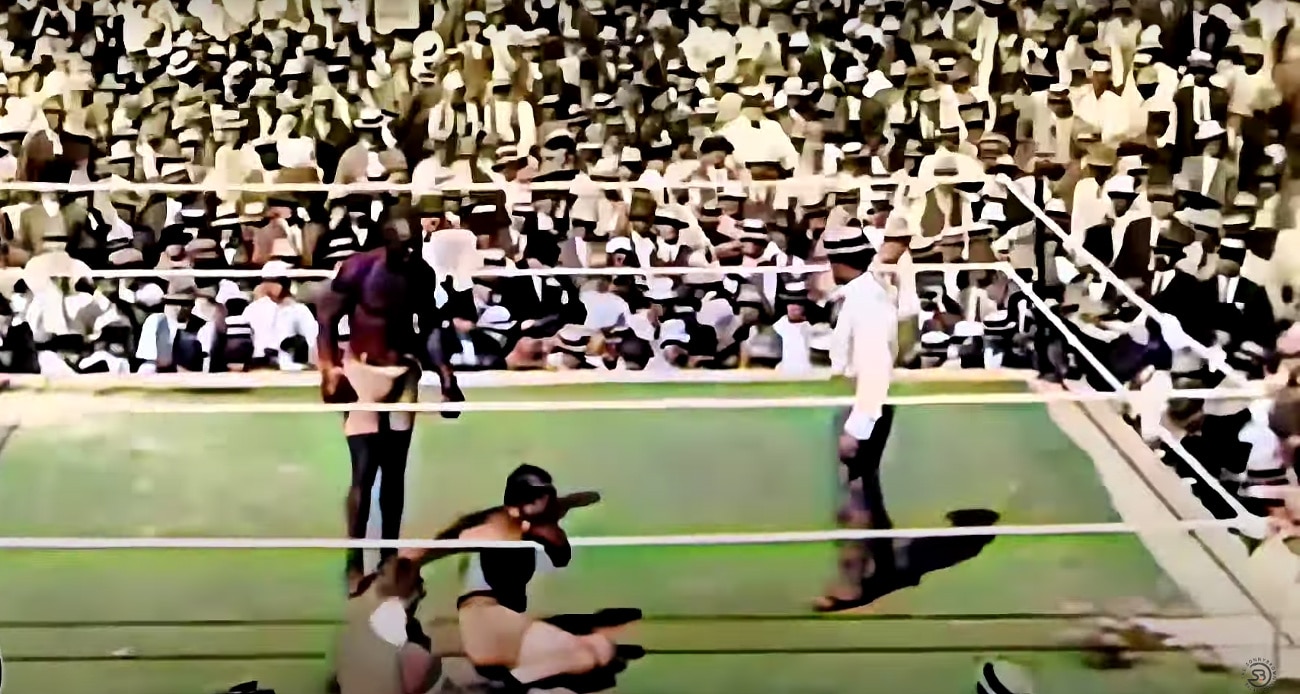It was in July back in 1910 when one of the first fights to be handed “Fight of The Century” billing took place in the heavyweight division. Jack Johnson, who had ruled since tearing the crown from Tommy Burns in Australia in December of 1908, was a figure so despised, hated, yet also feared by the white man; this the so-called superior race, that he simply had to be knocked off his lofty perch.
“Golden Jack” was cocky, he was arrogant, he flaunted the fact that he spent quality time with white women. In short, Johnson was far too brash for his own good (it really is a miracle he wasn’t murdered). So desperate were the American public (most of them anyway) to have Johnson beaten, a number of “Great White Hopes” were brought in to try and wrest the world title from Johnson and put it back where it belonged: in the hands of a white fighter. To quote a piece from The New York Times that ran just prior to Johnson’s challenge of Burns: “If the black man wins, thousands and thousands of his ignorant brothers will misinterpret his victory as justifying claims to much more than mere physical equality with their white neighbors.”
Truly disgraceful and a line of “thinking” that has thankfully long since been eradicated.
And there was a big problem for the “Great White Hopes” who went in with Johnson: Jack was far too superior a fighter for each and every one of them, with Tony Ross, Al Kauffman, and middleweight great Stanley Ketchel all being done away with. Further desperation saw to it that the great former champion James J. Jeffries, who had retired unbeaten in the summer of 1904, was dragged back to fight Johnson.
Despite the fact that he had gained a great deal of weight and now was aged 35, Jeffries, who really had no choice but to go through with the fight, was looked at as the man for the job: regain the crown, restore the natural order, put things right. And so, in Reno on a scorching July day, in a fight that was promoted by Tex Rickard, the former champ, weakened from having dropped so much weight, saw his unbeaten record forever ruined. The fight and its one-sided nature, a great moment for Johnson, makes us wonder how much higher Jeffries would rank amongst the greatest heavyweights of all time had it not taken place. Jeffries retired with an almost perfect record (2 draws but zero defeats) long before Rocky Marciano did.
But to repeat, Jeffries had no choice; the public pressure on him to wipe the smile off Johnson’s face was truly immense. And so it was that Johnson dished out a prolonged, nasty beating. Taunting his foe and constantly grinning throughout the fight, Johnson was soon in complete command. Jeffries did win a couple of the early rounds, with him even bloodying Johnson’s mouth in the fourth, but fatigue sure enough set in. Faster than the former champ and also a harder, sharper puncher, Johnson was the physically stronger man, with him able to tie Jeffries up whenever he wanted to do so.
His face was marking up more and more with the passing of each painful and soon exhausting round; Jeffries was being carried. Johnson could have ended the fight far sooner than he eventually did, in that there is no real doubt. The end finally came in round 15, when Johnson dropped a shattered Jeffries. Then, after Jeffries hoisted himself up by the ropes, Johnson knocked him through the ropes. It was over. But the race war was not.
There were deaths, and there was rioting across the country after Johnson’s win, with a reported 11 dead and many more injured, the victims all blacks.
It was indeed a terrible episode in America’s history. Johnson would not lose the title until April of 1915, this when he was the old man in the ring, being ready to be taken by the latest “White Hope.”

Click here to subscribe to our FREE newsletter
Related News:
- Video: Heavyweight Champions Tournament
- Recalling The Jack Johnson – Jim Jeffries “Fight Of The Century”
- On This Day In 1908 – Jack Johnson Destroys Tommy Burns To Become The First Black Heavyweight Champion
- Curmel Moton vs Wilfredo Flores confirmed for Feb. 28 in Verona
- Mario Barrios vs Ryan Garcia: Fight time, location and how to watch
- On This Day: The Marco Antonio Barrera Vs. Erik Morales Epic!
Last Updated on 07/25/2023


